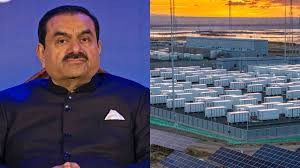Adani Group embarks on India’s largest battery energy storage project

IIE DIGITAL DESK : The Adani Group has announced its entry into the battery energy-storage systems (BESS) sector with a landmark installation of 1,126 MW / 3,530 MWh capacity, slated for commissioning by March 2026. The deployment will comprise over 700 BESS containers, making this move not only the biggest single-location BESS deployment in India but also among the largest globally.
Chief Executive and Chairman Gautam Adani emphasized that “energy storage is the cornerstone of a renewable-powered future” and that this project will reinforce India’s energy independence while delivering reliable, clean and affordable solutions at scale. The project is being developed at the location of the world-scale renewable energy park in Khavda, Gujarat, where advanced lithium-ion battery technology and sophisticated energy-management systems are being integrated to maximise grid efficiency.
From a strategic perspective, the Adani Group’s foray into BESS is designed to address several critical challenges facing India’s electricity grid: managing peak-load demand, reducing transmission congestion, mitigating solar curtailment, and enhancing overall grid reliability. The scale of this commitment is significant: beyond the initial project, the Group plans an additional 15 GWh of BESS capacity by March 2027, and a long-term target of 50 GWh over the next five years.
Experts highlight that this move marks a pivotal moment in India’s decarbonisation journey. As wind and solar renewable capacities continue to grow, effective storage solutions become vital if the country is to ensure clean power round the clock rather than only during daylight hours or favourable conditions. The Adani project thus positions itself as a key enabler for a low-carbon, resilient energy infrastructure.
Some of the technical highlights include the fact that 3,530 MWh storage capacity at 1,126 MW power means the facility can deliver full output for approximately three hours—enough to bridge the evening peak when solar output falls but demand remains high. By locating the facility alongside a large renewable-energy generation park, the integration between generation and storage becomes seamless—helping to absorb excess output and supply when needed.
Financially and operationally, this initiative is also a signal of confidence in large-scale BESS economics. As costs of battery systems continue to fall and lifecycles improve, major players such as the Adani Group are moving from pilot phases into industrial-scale deployment. This suggests a new phase of energy storage maturity in India.
From a policy angle, the project aligns with India’s broader goals: increasing renewable energy share, ensuring grid stability, and reducing reliance on fossil-fuel peaker plants. Storage systems help reduce the need for backup generation while enabling smoother integration of variable renewables. The project therefore not only serves business goals but also supports national energy-transition imperatives.
Looking ahead, key success factors will include the management of battery degradation, safety protocols (given the size and energy density involved), integration with grid-operators, and the ability to ramp up additional capacity on schedule. If successful, the Adani Group’s project may act as a benchmark for future deployments across India and potentially in other markets.
The Adani Group’s entry into the BESS domain with what is billed as India’s largest storage project marks a significant shift in the clean-energy landscape. With clear strategic intent, strong capacity targets, and timely alignment with national objectives, this development signals that energy-storage is becoming a cornerstone of India’s path to a sustainable grid.
You might also like!
















